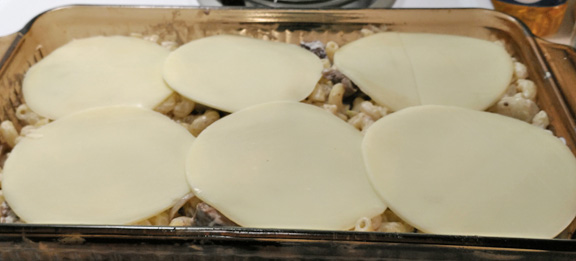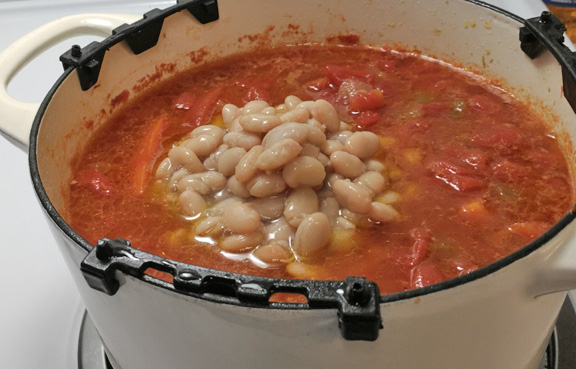This
easy meal features a wonderful array of vegetables with a flaky crust
that turns a golden color for your table. It is named for an LGBT
hero, leader and writer. Learn more about him in a short article
after the recipe.
Raid
the pantry and freezer for this comfort food. Not expensive and
healthy to boot! Great for an emergency when you don't want another
trip the store.
Ingredients
- 1 tube crescent rolls
- 1 (10.75-oz.) condensed cream of bacon soup (or mushroom)
- 1 (16-oz.) bag frozen mixed vegetables thawed
- ½ cup mushrooms, rinsed and dried
- ½ C. fat free milk
- ½ tsp. dried thyme
- ½ tsp. pepper
- 1 egg, lightly beaten
Directions
Preheat oven to 375 degrees.Spray a 9 x 9 casserole dish. Rinse and cut the mushrooms.
In a large bowl mix the vegetables and mushrooms.
In a medium bowl, combine soup, milk, thyme, and pepper.
Stir this into the vegetable mix until well incorporated. Spoon filling into casserole dish.
On a piece of wax paper unroll the crescent dough. Trim with a table knife to fit the same size as the dish.
Carefully invert over the casserole dish.
Brush with beaten egg. Cover with foil.
Bake for 20 minutes. Remove foil and then bake for 15 - 17 more minutes. You want the crust well golden brown.
BTW: those strips you trimmed off can go in the oven on a piece of foil and cook right along.
What a wonderful aroma fills the kitchen! So happy to be serving this to my Master Indy.
For our music: https://www.youtube.com/watch?v=ubjBU62aWbo
socialslave
To
satisfy and restore.
To
nourish, support and maintain.
To
gratify, spoil, comfort and please,
to
nurture, assist, and sustain
…..I
cook!
Please
buy slave's cookbook:
The
Little Black Book of Indiscreet Recipes by Dan White
http://www.amazon.com/dp/B00F315Y4I/ref=cm_sw_r_tw_dp_vAT4sb0934RTMvia @amazon
----------------------------------------------
Carl
Wittman
The blond-haired son of communist parents was jailed while participating in anti-segregation sit-ins at the Dorset Theater in Cambridge on Maryland's Eastern Shore in 1963.
He quickly became disillusioned about the anti-gay bigotry in the '60s radical “New Left.” Former SDS national secretary, bisexual Greg Calvert recalled, “I was defamed and discredited by my opponents . . . including a vicious and disgusting gay-baiting campaign . . . People talk about sexism—they should talk about homophobia in the movement.”
Wittman, while self-identified as gay since the age of 14, remained closeted until coming out in the article, "Waves of Resistance," published in the November, 1968 issue of the antiwar magazine, Liberation.
Then just a few months short of the Stonewall event, Wittman wrote Refugees from Amerika: A Gay Manifesto.
It is considered one of the most influential gay liberation writings of the 1970s.
The article became a guide to gay activism and gay life, and was used in particular by the Gay Liberation Front. The manifesto was re-printed in Joseph A. McCaffrey, (1972), "The Homosexual Dialectic":
“Like refugees,” he writes, we homosexuals have fled “blackmailing cops” who beat us, families who “disowned or 'tolerated' us,” and “small towns where to be ourselves would endanger our jobs and any hope of a decent life.” The time is now to “free ourselves.” “We are children of straight society,” but we must “stop mimicking straights.” Rather than “oppressive” “traditional marriage,” for example, he urges us to “define for ourselves a new pluralistic, rolefree social structure . . . instead of measuring our relationship in comparison to straight ones, with straight values.”
On coalition building he contends, “But we know we are radical in that we know the system that we're under now is a direct source of oppression, and it's not a question of getting our share of the pie. The pie is rotten.”
“We've been playing an act for a long time, so we're consummate actors” he concludes, “Now we can begin to be, and it'll be a good show!”
While living in the West, Wittman became involved in RFD, a "magazine for rural gays," first published in 1974. About the journal, Don Engstrom, one of the men who began the publication, stated that "original RFD'ers thought it was really important to build culture," it was "never about isolationism." Carl, he remarked, "was the first of us to start talking about how politics was truly about creating culture versus subverting culture."
In the early 1980s, Wittman continued his social activism and moved to the southeast. In North Carolina he co-founded the Durham Lesbian and Gay Health Project. Recognizing that people must be "confident that they have some control over the decisions which affect their lives.”
Instrumental figure in country dance
Carl Wittman, led the development of"gender-free" dance in which there were no gendered dance roles"
He started a local community dance in his barn in Golden, Oregon, where he pulled in people from several intentional communities, as well as families and friends from around the area. His dancing community ended up being a mixture of gay men, lesbians and friends.
Carl taught English and Scottish country dancing. He allowed anyone to dance with whomever they wished and in any role they chose. Not satisified with this, Carl changed his role identification system to "Reds" and "Greens" (Reds identifying the traditional gent's position and Greens to identify the lady's position). He went on to further develop this to a method defined as "Left File" and "Right File" dancers (the left file identifying the traditional gent's role and the right file identifying the traditional ladies position).
Carl traveled around Oregon, starting other dance communities, and teaching this style of English and Scottish Country Dancing. Carl developed another tradition during this time, that being of how to line up for each dance. He advocated that everyone come to the set individually and fill in the next available space. This method ensures that everyone will have someone to dance with and addressed the sometimes-awkward practice of asking someone to dance, particularly with folks new to the dance.
In his manual on that dance style, he stated: “We will dance as an ever changing stream of faces, and groups will come together as a community rather than breaking up into cliques. No wall-flowers, no most-populars, no competition.” “And it worked,” a friend remembered about it, “mixing up dykes and fags, hets and straights, men and women in constantly shifting patterns, and it didn't really matter who was what.”
As Carl did “final work on the dance book” and said “the most essential goodbyes,” he recalled that same friend in a poignant newsletter article of farewell.
Carl Wittman had suffered from AIDS complications. When it became too painful in 1986 he called his friends together at his home and orchestrated his own death.





















































